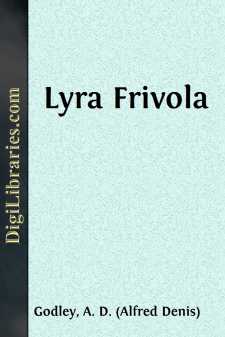Categories
- Antiques & Collectibles 13
- Architecture 36
- Art 48
- Bibles 22
- Biography & Autobiography 815
- Body, Mind & Spirit 144
- Business & Economics 28
- Children's Books 18
- Children's Fiction 14
- Computers 4
- Cooking 94
- Crafts & Hobbies 4
- Drama 346
- Education 58
- Family & Relationships 59
- Fiction 11833
- Games 19
- Gardening 17
- Health & Fitness 34
- History 1378
- House & Home 1
- Humor 147
- Juvenile Fiction 1873
- Juvenile Nonfiction 202
- Language Arts & Disciplines 89
- Law 16
- Literary Collections 686
- Literary Criticism 179
- Mathematics 13
- Medical 41
- Music 40
- Nature 179
- Non-Classifiable 1768
- Performing Arts 7
- Periodicals 1453
- Philosophy 65
- Photography 2
- Poetry 896
- Political Science 203
- Psychology 44
- Reference 154
- Religion 515
- Science 126
- Self-Help 85
- Social Science 82
- Sports & Recreation 34
- Study Aids 3
- Technology & Engineering 59
- Transportation 23
- Travel 463
- True Crime 29
A. D. (Alfred Denis) Godley
Alfred Denis Godley (1856–1925) was an English classical scholar, poet, and humorist, best known for his witty Latin verses. He held several academic posts at Oxford University, where he also became known for his playful translations and works in classical scholarship. One of his most famous works is "Motor Bus," a humorous Latin poem that mimics the sound of a motor bus through its verse. Godley also wrote "Lyra Frivola," a collection of light-hearted and satirical poems, reflecting his whimsical style.
Author's Books:
Sort by:
AFTER HORACE What asks the Bard? He prays for nought But what the truly virtuous crave: That is, the things he plainly ought To have. 'Tis not for wealth, with all the shocks That vex distracted millionaires, Plagued by their fluctuating stocks And shares: While plutocrats their millions new Expend upon each costly whim, A...
more...
I. Not concerning a thing of no moment, O Conscript Fathers, you are now called upon to decide: whether to one man by the counsel and advice of Curators it is to be permitted that he should take away from you the power of placing in the Proscholium the instruments of celerity, the assistances of (your) feet, the machines appointed by a certain natural providence for the performance of your duties:...
more...



